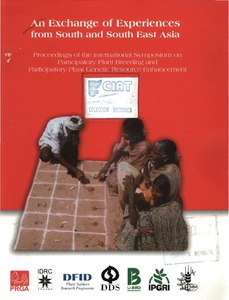Participatory varietal selection in finger millet
Abstract
Finger millet (Eleusine coracana L. Gaertn.) is an important small millet for rainfed areas in India. A dozen varieties have been released for cultivation but there is little adoption by farmers, particularly in the Chitradurga and Bellary districts of Karnataka state where the present study was conducted. Participatory rural appraisal (PRA) showed that all farmers wanted higher grain and fodder yields, while only 8% mentioned resistance to diseases. Varieties of 105 to 110 days duration with moderate to high tillering and compact-top, in-curved ears were more acceptable. The PRA al so showed that there was a varietal monoculture of PR 202 from Andhra Pradesh state.
Six varieties were selected for testing with farmers. They were chosen from those released for Karnataka but not adopted, and from those that were promising in all India coordinated trials. Most of them performed well in two-year trials. Participatory varietal selection (PVS) trials were conducted with 150 farmer, in seven villages. Pre- and post-harvest focus-group discussions (FGDs) revealed that the two recently released varieties, GPU 26 and GPU 28, met several of the farmers' selection criteria. GPU 26 was found to be suitable for late sowing up to the middle of August if the onset of rain was delayed, but GPU 28 could be grown in the second week of July. Among the no released varieties, the snort-duration variety (85 days), VL 305, was identified to be suitable as a second crop for sowing in September afire sesame or cowpea-an option not available to farmers with the released varieties Or nonrelated cultivars.

